Parrot Care in Winter
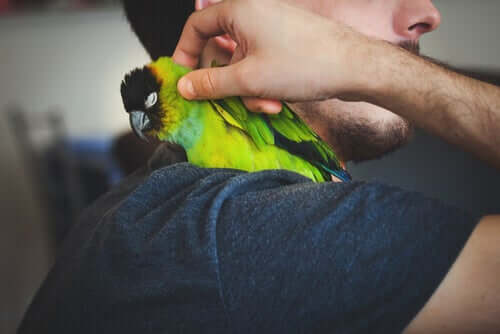
Below, we’ll summarize parrot care in winter and their basic needs, to help you look after your pet’s health.
Because of their intelligence, beauty, and ability to speak, parrots have become a popular pet for many children and adults. In addition to basic hygiene and nutrition care, birds need to be protected from the cold.
Parrots: physique and behavior
There are more than 300 species of parrot that we can class as Psittaciformes. Cockatoos, macaws, and parakeets are among the most popular domestic pets.
Many have discussed how to categorize them into subfamilies and races, but the physical similarities shared by these birds are visible. They have short, strong hook-shaped beaks, attractive colorful plumage, rounded and short wings, and distinct claws.
Their beautiful plumage, intelligence, and ability to speak are what make these species undeniably attractive. However, a bird only properly develops its skills when it feels healthy and safe.
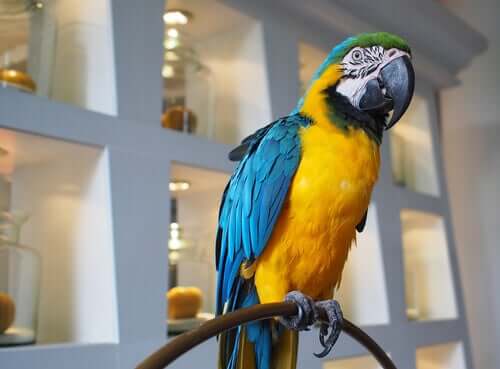
Therefore, before adopting a parrot as a pet you need to learn about its basic needs and the care that they require.
Parrot care in winter: preventive medicine
Preventive medicine is a crucial aspect of pet parrot care. They get sick easily, not only because of cold weather, but also because of poor hygiene or malnutrition.
Proper preventive medicine should include regular visits to the vet, vaccinations and deworming , regular hygiene habits, and a balanced diet. Responsible bird handling is essential to preserve these species and prevent the spread of various diseases, such as zoonoses.
As the colder seasons approach, it’s important to take your parrot to a specialized vet. Reviewing their health before winter is important to avoid any illnesses. You can also take advantage of this consultation by deworming your pet.
Your parrot’s hygiene is critical to its health
It’s very important not to neglect your parrot’s hygiene when the days get colder. Even though birds are naturally clean animals, they can easily be affected by internal and external parasites. These microorganisms spread easily throughout your pet’s cage and accessories.
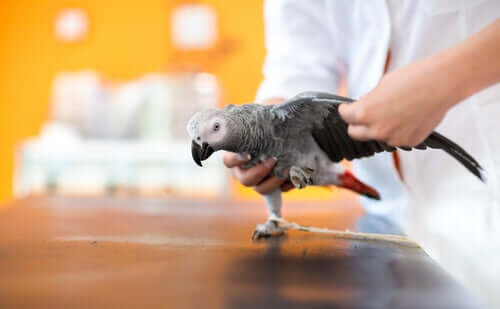
Cleaning droppings and food dishes daily is important. When these accumulate, illnesses are more likely to multiply.
It’s also essential to sanitize your parrot’s cage and area twice a week. All accessories must be washed and disinfected to remove fungi and bacteria.
There are specific products to combat ectoparasites in birds, mainly the red spider mite. You should use them in your parrot’s grooming supplies and preventive medicine.
In addition, checking its legs, feathers, and beak weekly is important. If you notice any wounds or changes in color, you need to take your pet to the vet immediately.
The perfect environment to protect your parrot from the cold
Parrots are native to warm, tropical, and subtropical climates, where temperatures don’t vary much. With the arrival of winter, we need to prepare their homes to protect them from low temperatures.
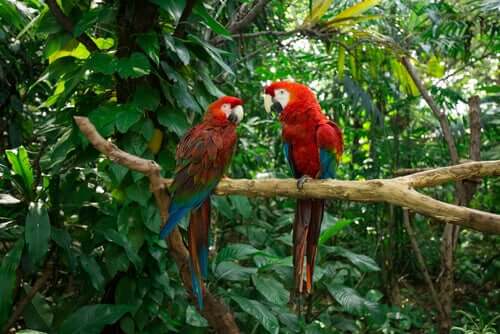
The most important thing to do is to prevent your parrot from being exposed to the elements during the winter. Rain, snow, winds, cold gusts can all pose a serious threat to your pet’s health.
If the animal is used to living outside the home, we must ensure that it is very well sheltered. For parrots raised inside the home, the location of the cage is also important. Avoid leaving it close to windows where air currents are more likely to be.
Central heating is perfect for maintaining stable temperatures and providing comfort– preferably close to 75°F.
However, if the environment gets too dry, your parrot can develop certain respiratory diseases. Therefore it’s a good idea to humidify the environment or spray some water on their feathers twice a week.
Parrot care in winter: balanced diet
In the wild, parrots maintain a varied diet and easily adapt to almost all types of food. About 80% of their diet should be made up of fruit and vegetables. The other 20% can be supplemented with seeds and grains.
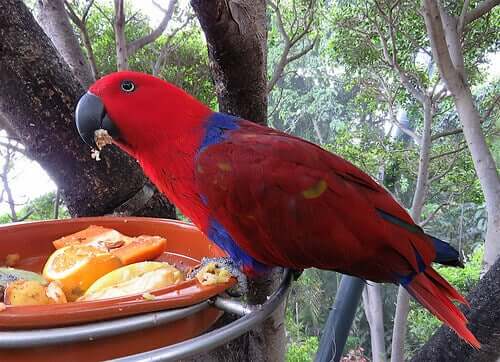
During the winter, they need a high-calorie diet, rich in protein, carbohydrates, and fats. You can include hard-boiled eggs, yogurt, and rice to their diet two to three times a week.
You can also increase their consumption of nuts, such as walnuts, chestnuts, peanuts, or sunflower seeds. However, please be aware that excessive consumption of these seeds can cause liver damage.
We can’t forget about the parrot’s hydration as part of its winter care, especially in a heated environment. Therefore, we need to keep their water fresh and clean throughout the day. As well as cleaning their water container daily and constantly changing its contents.
All cited sources were thoroughly reviewed by our team to ensure their quality, reliability, currency, and validity. The bibliography of this article was considered reliable and of academic or scientific accuracy.
- Ombugadu, A., Echor, B., Jibril, A., Angbalaga, G., Lapang, M., & Micah, E. (2018). Impact of parasites in captive birds: a review. Curr Res Environ Biodivers, 2019(04), 1-12.
